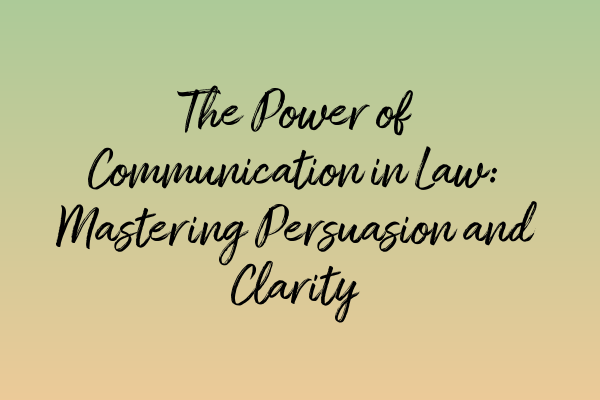The Power of Communication in Law: Mastering Persuasion and Clarity
Effective communication is a vital skill for any solicitor. In the field of law, the power of communication cannot be understated. A solicitor must be able to persuade, inform, and engage clients, judges, and juries through clear and concise language. Mastering the art of communication can open doors to success in legal practice and enable solicitors to achieve the best possible outcomes for their clients.
Persuasion is a key aspect of effective communication in the legal profession. When presenting a case in court or negotiating with opposing parties, solicitors must be able to convince others of the validity of their arguments. Persuasive communication involves utilizing compelling language, logical reasoning, and credible evidence to win over the audience. By skillfully presenting their case, solicitors can influence judges and juries to rule in their clients’ favor.
Clarity is equally important in legal communication. The law can be complex and filled with technical jargon that may confuse clients and non-legal professionals. It is the solicitor’s responsibility to translate this complex information into clear and understandable language. By using plain English and avoiding unnecessary legal terminology, solicitors can ensure their clients fully comprehend the legal processes and implications. Clarity of communication also extends to written documents such as contracts, letters, and legal opinions. A well-written document that can be easily understood by all parties involved is essential for building trust and credibility.
So, how can solicitors enhance their communication skills and harness the power of persuasion and clarity?
1. Develop Strong Writing Skills:
Writing is a fundamental aspect of legal practice. Solicitors should strive to write clearly, concisely, and persuasively. By organizing their thoughts and arguments in a logical manner, they can effectively communicate complex legal concepts to their audience. Moreover, it is crucial to proofread and edit written documents carefully to eliminate errors and ensure professional presentation.
2. Master the Art of Oral Advocacy:
Public speaking and oral advocacy skills are essential for solicitors who engage in courtroom proceedings. By developing a strong and confident speaking style, solicitors can effectively present their arguments, cross-examine witnesses, and deliver closing statements. Practice, preparation, and learning from experienced advocates can boost oral advocacy skills significantly.
3. Active Listening:
Effective communication is a two-way process. Solicitors must actively listen to their clients to understand their needs, concerns, and objectives. Active listening involves paying full attention, asking clarifying questions, and demonstrating empathy. By truly understanding their clients, solicitors can tailor their communication to address their specific needs and build trust.
4. Utilize Non-Verbal Communication:
In addition to words, non-verbal cues can play a significant role in communication. Body language, facial expressions, and gestures can convey confidence, sincerity, and credibility. Solicitors should pay attention to their own non-verbal communication and also be observant of others’ non-verbal cues in order to effectively assess their audience’s reactions and responses.
In conclusion, the power of communication cannot be underestimated in the field of law. Solicitors who master persuasion and clarity through effective communication techniques can achieve success in their legal practice. By continuously developing and refining their communication skills, solicitors can better serve their clients, persuade judges and juries, and ultimately achieve favorable outcomes in legal proceedings.
Related Articles:
– Rights of the Accused: Protecting Individual Liberties in Criminal Proceedings
– Magistrates’ Court vs Crown Court: Understanding Key Differences
– Protecting Vulnerable Witnesses in Criminal Trials: Best Practices and Legal Safeguards
– Unraveling the Complexities of UK Bail Laws
– Cross-Examination Techniques: Mastering the Art of Questioning Witnesses


Leave a Reply